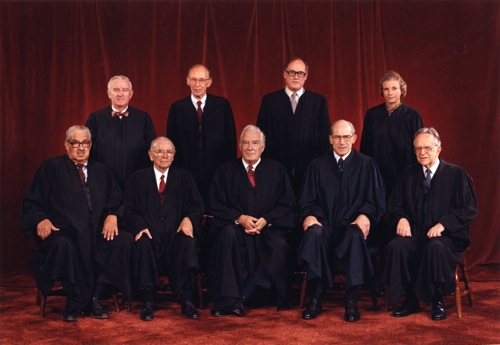Plyler v. Doe was argued in the Burger Supreme Court on December 1, 1981.

The Burger Court, (1981-1986), (Oyez)
Plyler v. Doe was argued in the Burger Supreme Court on December 1, 1981.

The Burger Court, (1981-1986), (Oyez)
The school district’s main argument centered around the issue of limited resources and inadequate funding to sustain undocumented immigrants in their schools.
"With the federal government doing very little, nothing at all realistically, to help the impacted school districts in providing a basic program of education to their residents, be them legal or illegal presently, the Texas legislature enacted Section 21.031 of the Texas Education Code in 1975 to curtail the drain of the state's educational resources and those of its districts, which drain only promised to increase in the future."
- Plyler v. Doe, 457 US 202 (1982)
The families' case, on the other hand, rested on four main points:
“First, they alleged that the policy of excluding illegal alien children from school is implemented only against those children who are of Mexican origin and thus discriminates invidiously on the basis of national origin in violation of Title VI of the 1964 Civil Rights Act and the Equal Protection Clause of the Fourteenth Amendment. Secondly, plaintiffs have alleged that in implementing this policy, the Tyler I.S.D. has failed to provide plaintiffs a legally sufficient opportunity to contest the imposition of tuition and are denying plaintiff the procedural due process guarantees of the Fourteenth Amendment. Thirdly, plaintiffs have alleged that the imposition of tuition upon those children who are unable to document their United States citizenship or legal alien status discriminates against these children in violation of the Fourteenth Amendment. Finally, plaintiffs allege that the State statute and local policy invade the exclusive jurisdiction of the United States to regulate immigration and naturalization in violation of the Supremacy Clause.”
- Plyler v. Doe - Post-Trial Brief of the United States, (Civil Rights Litigation Clearinghouse)
On June 15, 1982, in a 5-4 decision, the Burger Court ruled in favor of the plaintiffs. The Court presented 5 different opinions: the majority, dissenting, and three concurring opinions.

The Lopez family on NBC TV after their Supreme Court win, (NBC News)
The majority opinion was delivered by Justice Brennan and joined by Justices Marshall, Blackmun, Powell, and Stevens.
It held that by denying undocumented children the right to education, they are unfairly burdened and lack the ability to contribute in any meaningful way to society.
“Section 21.031 imposes a lifetime hardship on a discrete class of children not accountable for their disabling status. The stigma of illiteracy will mark them for the rest of their lives. By denying these children a basic education, we deny them the ability to live within the structure of our civic institutions and foreclose any realistic possibility that they will contribute in even the smallest way to the progress of our Nation."
- Plyler v. Doe, 457 U.S. 202 (1982)

Justice Thurgood Marshall (1967-1991), (Thurgood Marshall College Fund)
Justice Marshall filed his concurring opinion on the basis that discrimination against any group of people was unconstitutional.
"It continues to be my view that a class-based denial of public education is utterly incompatible with the Equal Protection Clause of the Fourteenth Amendment"
- Justice Thurgood Marshall, Plyler v. Doe. 457 U.S. 202, 1982
Justice Blackmun separately argued that the fundamental nature of education was central to the case.
"Classifications involving the complete denial of education are, in a sense, unique, for they strike at the heart of equal protection values by involving the State in the creation of permanent class distinctions [...] In a sense, then, denial of an education is the analogue of denial of the right to vote: the former relegates the individual to second-class social status; the latter places him at a permanent political disadvantage"
- Justice Harry Blackmun, Plyler v. Doe. 457 U.S. 202, 1982

Justice Harry Blackmun (1970-1994), (On This Day)

Justice Lewis Powell (1972-1987), (Bill Moyers)
Justice Powell noted that Section 21.031 would unjustly penalize undocumented children for the actions of their parents.
"They are excluded only because of a status resulting from the violation by parents or guardians of our immigration laws and the fact that they remain in our country unlawfully. The appellee children are innocent in this respect. They can 'affect neither their parents' conduct nor their own status.'"
- Justice Lewis Powell, Plyler v. Doe. 457 U.S. 202, 1982
The dissenting opinion was delivered by Chief Justice Burger and joined by Justices White, Rehnquist, and O’Connor.
It held that while no child, regardless of immigration status, should be deprived of an education, as it was within the jurisdiction of Congress, not the Court, to determine how undocumented immigrants should be treated under the law, especially in matters involving public resources.
"We trespass on the assigned function of the political branches under our structure of limited and separated powers when we assume a policymaking role as the Court does today [...] The Court makes no attempt to disguise that it is acting to make up for Congress' lack of ‘effective leadership’ in dealing with the serious national problems caused by the influx of uncountable millions of illegal aliens across our borders."
- Chief Justice Burger, Plyler v. Doe, 457 US 202 (1982)
Post-ruling, the defendants conceded that “[a]ny school-age child is severely harmed by being denied access to an education,” and Plyler later came out with a statement saying “I’m glad we lost the Hispanic [court case], so that those kids could get educated.”
Thousands of formerly expelled undocumented students were readmitted under the full and immediate authority of the ruling.